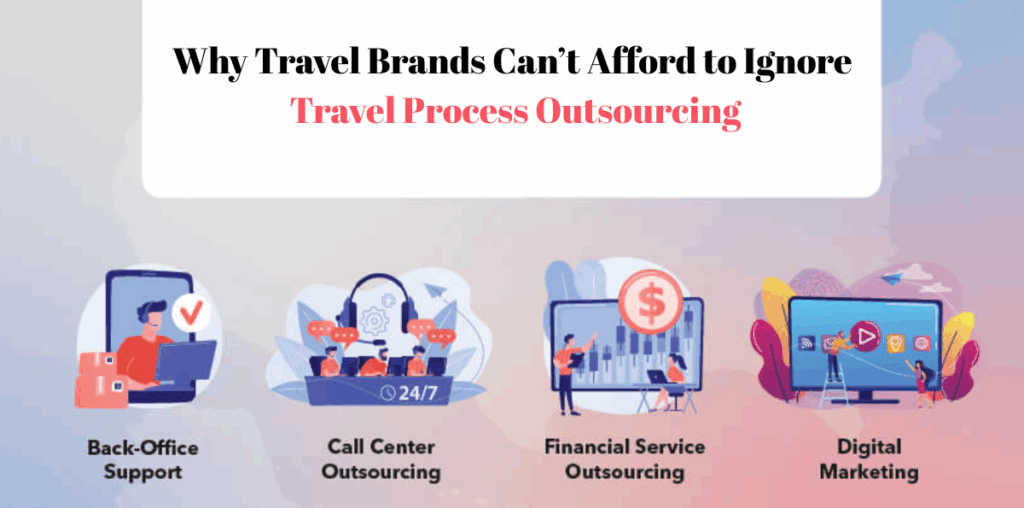The travel and tourism industry has undergone tremendous evolution, influenced by digitization, consumer behavior shifts, and global disruptions like the COVID-19 pandemic. In this high-stakes, margin-sensitive environment, travel brands—ranging from agencies to tour operators and global travel management companies—are under pressure to enhance efficiency, reduce costs, and elevate the customer experience.
Travel Process Outsourcing (TPO) has emerged as a strategic lever for accomplishing these goals. In this blog, we’ll explore why travel brands can no longer afford to ignore this powerful solution and how it plays a crucial role in staying competitive in 2025 and beyond.
Understanding Travel Process Outsourcing
Travel Process Outsourcing refers to the delegation of travel-related operational and support functions to specialized third-party service providers. These partners possess the technology, expertise, and infrastructure to handle critical travel processes with precision, speed, and scalability.
Commonly Outsourced Travel Functions:
- Flight and Hotel Booking Management: Handling reservations, modifications, and cancellations for flights and accommodations.
- Itinerary Creation and Updates: Preparing detailed travel plans and making real-time changes as needed.
- Customer Support (Chat, Email, Phone): Offering 24/7 assistance to travelers across multiple communication channels.
- Billing and Payment Processing: Managing invoicing, payments, and financial reconciliations.
- Refunds and Travel Claims: Processing cancellations, refunds, and traveler compensation requests.
- Loyalty Program Management: Enrolling customers, tracking points, and managing rewards systems.
- Data Analytics and Reporting: Generating insights on traveler behavior, operational efficiency, and business KPIs.
- Vendor and Partner Coordination: Communicating with hotels, airlines, and other travel partners to ensure seamless service delivery.
Travel Process Outsourcing providers act as an extension of the brand, ensuring service quality while allowing internal teams to focus on core business innovation and customer strategy.
Key Drivers Behind the Rise of Travel Process Outsourcing
Several industry forces are driving the adoption of Travel Process Outsourcing at scale:
a) Rising Operational Complexity
With multi-channel bookings, 24/7 customer demands, and complex regulations, managing travel operations internally has become increasingly burdensome.
b) Need for Round-the-Clock Service
Outsourcing enables brands to deliver consistent global support, regardless of time zones, without straining internal resources.
c) Cost Efficiency Pressure
Travel margins are shrinking. Outsourcing offers a more cost-effective way to manage labor-intensive processes like ticketing, support, and reconciliations.
d) Technology Integration
Outsourcing partners offer robust tech stacks that integrate seamlessly with GDS systems, CRM platforms, and payment gateways.
e) Demand for Personalization
TPO providers leverage data to deliver hyper-personalized travel experiences that modern travelers expect.
Benefits Travel Brands Gain from Outsourcing
Here’s why travel companies are shifting toward Travel Process Outsourcing more than ever before:
Cost Reduction
- Lower overheads by eliminating the need for large in-house teams.
- Pay-as-you-go or SLA-based pricing structures align costs with performance.
Access to Specialized Talent
- Benefit from teams trained in travel operations, including certified GDS professionals.
- Multilingual agents provide global support in native languages.
Enhanced Agility
- Scale up or down easily during seasonal fluctuations.
- Respond faster to market changes, such as travel restrictions or price shifts.
Improved Customer Experience
- Dedicated support improves booking experiences, loyalty program engagement, and complaint resolution.
- Consistency across channels improves brand reputation.
Data-Driven Decision Making
- Outsourcing partners offer real-time dashboards, analytics, and reporting for insight-led strategies.
Core Functions Typically Outsourced in the Travel Sector
Outsourcing doesn’t mean giving away control—it means optimizing focus. Below are core travel operations often handled through Travel Process Outsourcing:
| Process Area | Description |
| Reservation Services | Handling bookings, rebookings, cancellations |
| Fare & Rate Auditing | Verifying accurate fare calculations |
| Ticketing Services | Managing issuance, voids, refunds |
| CRM Support | Chat, email, and voice customer service |
| Mid-Office Operations | Vendor confirmations, itinerary updates |
| Finance and Back-Office | Billing, payment processing, reconciliation |
| Loyalty Program Management | Enrolling, tracking, and managing points |
How Travel Process Outsourcing Enhances Customer Experience
In travel, customer experience is everything. Delayed responses, incorrect bookings, or unresolved complaints can quickly damage brand trust. TPO enhances the experience in the following ways:
- Faster Response Times: Dedicated contact centers mean reduced wait times and improved issue resolution.
- Intelligent Personalization: Use of AI and customer data to suggest relevant offers and upgrades.
- Omnichannel Support: Seamless service across mobile, web, email, phone, and social channels.
- Proactive Communication: Real-time travel alerts, itinerary updates, and refund status updates boost satisfaction.
Potential Challenges and Mitigation Strategies
While the benefits are substantial, travel brands must address the following risks when pursuing Travel Process Outsourcing:
| Challenge | Mitigation |
| Data Security Risks | Choose providers with ISO 27001 and GDPR compliance |
| Loss of Brand Voice | Implement training programs and branding guidelines |
| Time Zone Misalignment | Opt for providers with global presence and redundancy |
| Lack of Process Visibility | Use SLAs, KPIs, and integrated dashboards for transparency |
Travel Process Outsourcing vs. In-House Operations
| Feature/Metric | In-House | Travel Process Outsourcing |
| Cost | Higher (fixed costs) | Lower (variable/contract-based) |
| Scalability | Limited | High |
| Specialized Expertise | Requires training | Readily available |
| Tech Integration | Costly and slow | Pre-integrated platforms |
| Customer Support Quality | Depends on team size | 24/7 multilingual capabilities |
Future Outlook and Strategic Recommendations
Future Outlook
The global Travel Process Outsourcing market is expected to grow at a CAGR of 11.5% through 2030, driven by automation, rising travel volumes, and the need for scalability.
Recommendations for Travel Brands:
- Start small by outsourcing one function like support or ticketing.
- Choose partners with industry expertise and strong tech capabilities.
- Integrate SLAs into contracts to ensure performance metrics are met.
- Use analytics from outsourcing dashboards to refine strategy.
Conclusion
In the fiercely competitive travel industry, success hinges on agility, operational efficiency, and customer-centricity. Travel Process Outsourcing is no longer a luxury—it’s a necessity. From cost reduction to customer experience, the advantages are too significant for travel brands to ignore.
By embracing outsourcing, brands not only gain access to world-class expertise and technology but also free up resources to focus on growth, innovation, and brand differentiation.
Frequently Asked Questions
1. What is Travel Process Outsourcing?
It’s the practice of delegating travel-related operations—like bookings, support, or back-office functions—to third-party service providers.
2. Is TPO only suitable for large travel companies?
No. Startups, mid-sized agencies, and large enterprises can all benefit depending on their needs and strategy.
3. How do I ensure quality control with an outsourcing partner?
Use SLAs, frequent audits, performance dashboards, and regular training to maintain quality.
4. What are the cost benefits of Travel Process Outsourcing?
TPO can reduce operational costs by up to 40% depending on the scope of services and provider efficiency.
5. Does TPO support digital transformation in travel?
Absolutely. Most providers use cloud-based systems, AI tools, and data analytics that help modernize travel operations.




